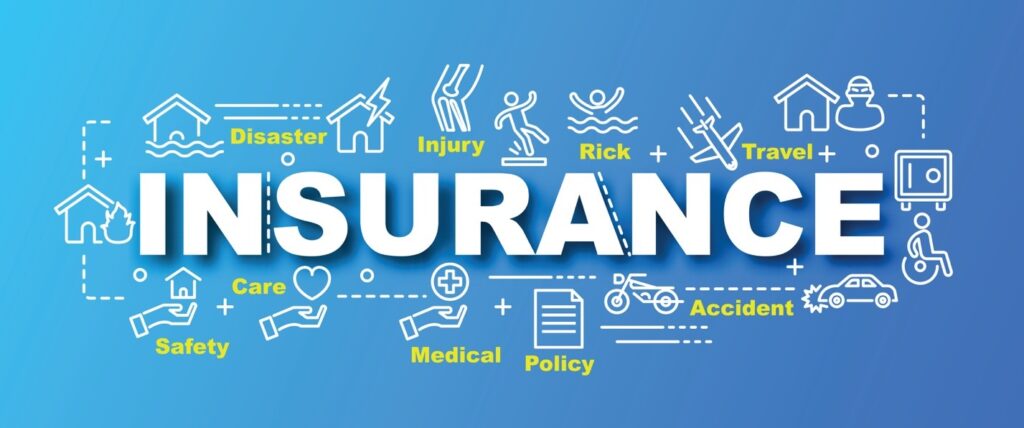Insurance provides financial protection against unforeseen events. It is a contract between the company and the individual, where the individual pays the premium and the insurer promises to pay a sum guaranteed at the time of unforeseen events. In India, the insurance industry is regulated by the IRDAI (Insurance Regulatory and Development Authority), which basically protects policyholders against any kind of fraud.

Insurance is classified into two categories: general insurance and life insurance.
General Insurance
General insurance is a non-life insurance policy that provides financial protection against losses caused by accidents, fire, health, burglary, etc. The tenure of general insurance would be comparatively shorter, ranging from 12 months to 10 years.
Various types of general insurance
1. Health insurance
This insurance covers health-related issues such as injury, sickness, and diseases. The insurer pays the medical treatment expenses on behalf of the patient. These days, health care is getting expensive, so to tackle such unexpected medical expenses, you need to buy health insurance.
Ideally, health insurance provides protection against critical illness treatment, hospitalization, bills after hospitalization, daycare procedures, etc. There are different kinds of health insurance: individual health insurance, family health insurance, group health insurance, and older person health insurance. From the name itself, one can understand the purpose of such plans.
2. Vehicle insurance
while you buy a vehicle, it is mandatory that you also buy vehicle insurance. As per the law in every country, insurance on vehicles is compulsory. This insurance provides coverage for accidents, fire, damage due to flooding, etc. to the vehicle. Vehicle insurance can be further classified into
1. Car Insurance: The cars owned by the individual come under this plan. The damage caused to the third party can also be covered if you pay a higher premium.
2. Two-wheeler insurance: This plan covers two-wheeler vehicles like bikes, scooters, etc. against accidents, damage, etc.
3. Commercial vehicle insurance: In this policy, commercial vehicles such as taxis, rickshaws, trucks, etc. are covered.
3. Property insurance or home insurance
The insurance provides financial protection against damage to property caused by fire, earthquake, flood, theft, and other natural disasters. Residential properties, commercial properties, properties owned by the government, etc. are all covered under this plan. The premium for these plans is usually high, and the premium depends on various factors such as property cost, risk involved, etc.
4. Fire insurance
Fire insurance provides protection against the losses caused by fire. All the assets, such as machinery, buildings, inventory, and equipment, are covered under this insurance. The major reason to buy this insurance is that there are high chances that, due to an electrical malfunction, human-made disaster, or natural disaster, the chances of damages or losses due to fire are high. There are certain types of businesses where fire insurance is mandatory by law. These include oil, gas, and petroleum companies and those that deal with hazardous goods that are highly flammable. There risk of fire is very high.
5. Travel insurance
After the wave of COVID-19, it has been seen that the travel industry is booming, and the cost of traveling has increased. At this moment, when travel costs are very high, one should buy travel insurance before traveling. The reason behind this is that medical expenses in developed countries are high. This plan covers all sorts of medical expenses, along with theft while traveling, loss of passport, loss of baggage, and flight cancellation.
Life Insurance
The life insurance plan provides financial protection at the time of death or disability. During death, the family members or nominees of the insured get the lump sum money, and at the time of disability due to accident or due to any other reason, the insured person receives the monthly payment or lump sum from the insurance company.
Life insurance can be further classified.
1. Term insurance
Term insurance is one of the cheapest and most affordable forms of insurance. The premiums are very low, and the sum assured will be very high. For Example, I am 23 years old and I have bought an HDFC term insurance plan at a premium of just Rs 1400. The sum assured of this plan is Rs 1.25 crore, and it also includes a disability rider of Rs 25 lakhs.
2. Whole life insurance
Unlike term insurance, where the plan matures after a certain period (for example, 40 years), In whole life insurance, the entire life of the insured is covered, and after the death of the policyholder, the nominee will receive the lump sum amount.
Here, the companies will have plans where the premium payment has to be done for 20 to 30 years, and some plans need premium collection for the entire lifetime.
3. Unit-linked insurance plan (ULIP)
In ULIPs, the insurance policy is combined with the investment plan. Out of the premium paid by the insured, a certain amount is invested in assets like equity, debt, gold, etc. These types of plans are usually sold falsely to clients, claiming that they generate high returns. These plans provide good commission for the sales agent, but they’re worse as an investment avenue for investors. After the death of the policyholder, the nominee gets the sum assured or the value of the funds, whichever is higher.
4. Endowment plan
It is a form of insurance that combines life insurance with a savings plan. In this plan, either the policyholder receives the lump sum after maturity or, in the event of death, the nominee will receive the death benefit. These plans usually mature after five, ten, and fifteen years. These are specially designed to save money along with the insurance benefit.
5. Pension Plans
These are the types of investment plans offered by life insurance companies. In a pension, one receives regular income after retirement. Once the income has been stopped after retirement to lead a life, one needs money. The pension plan is designed for this purpose. It is also an essential instrument for retirement planning.
Conclusion
There are different types of insurance in the market. Based on your requirements and financial goals, buy the best one. Seek help from an investment advisor to buy the best insurance for you and your family. Being financially free is not only important. One should have good health and term insurance policies for any unforeseen circumstances.
Checkout out other blogs
